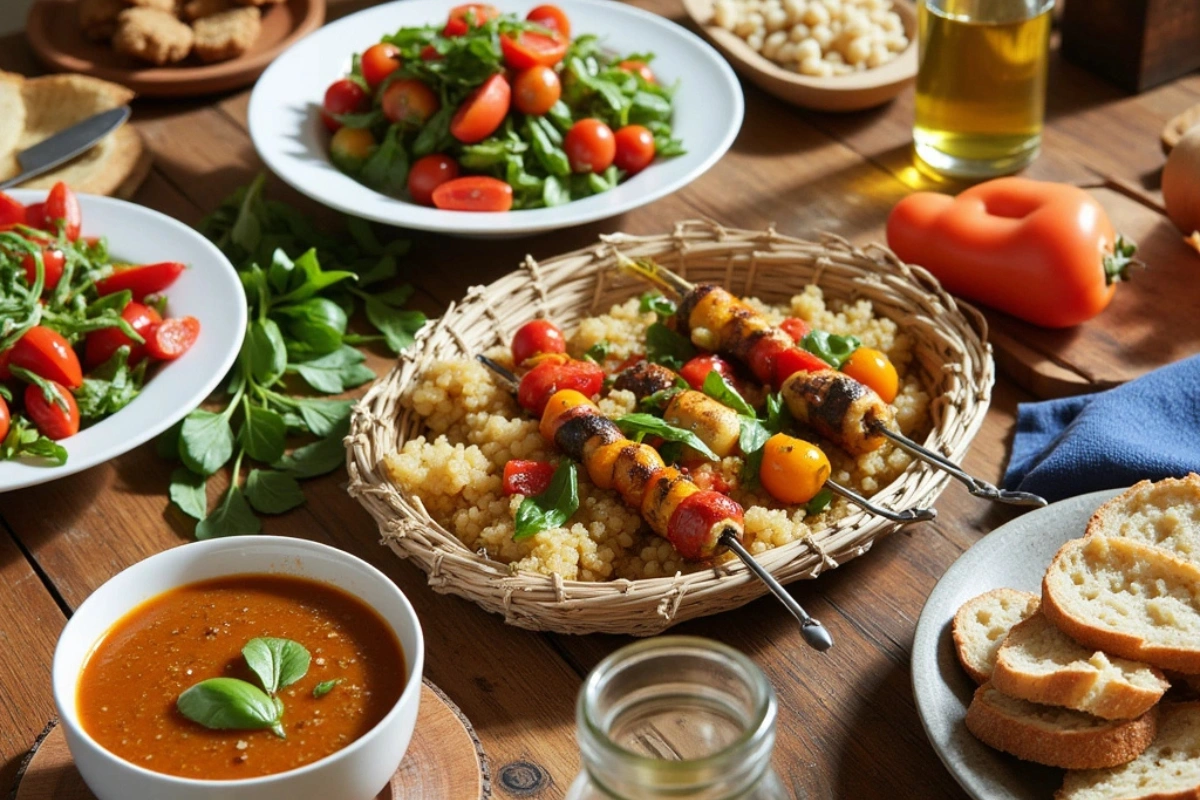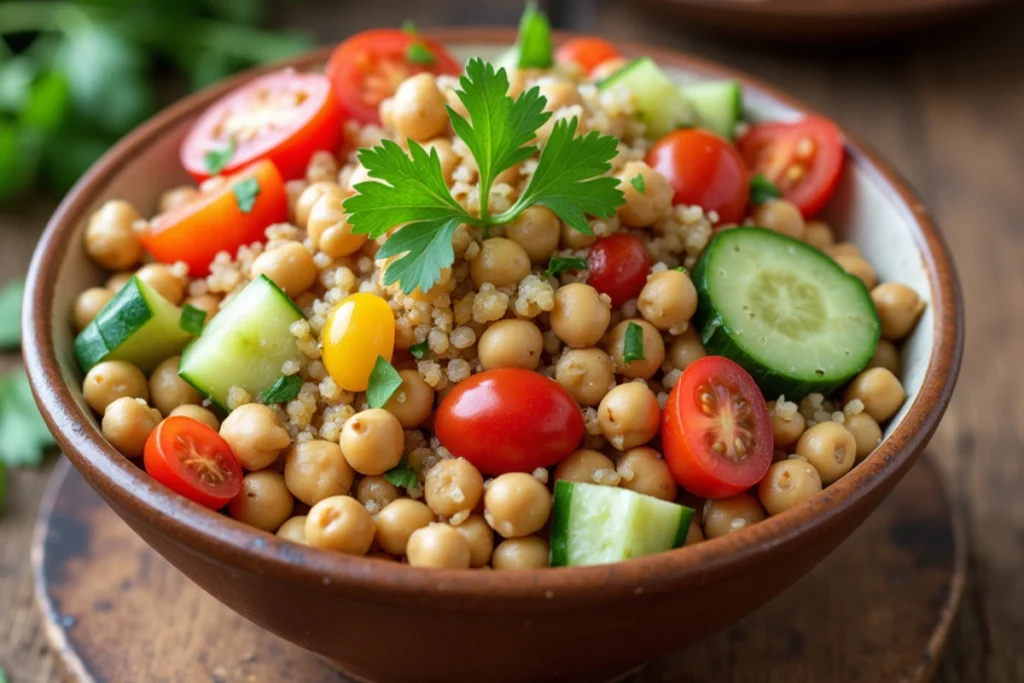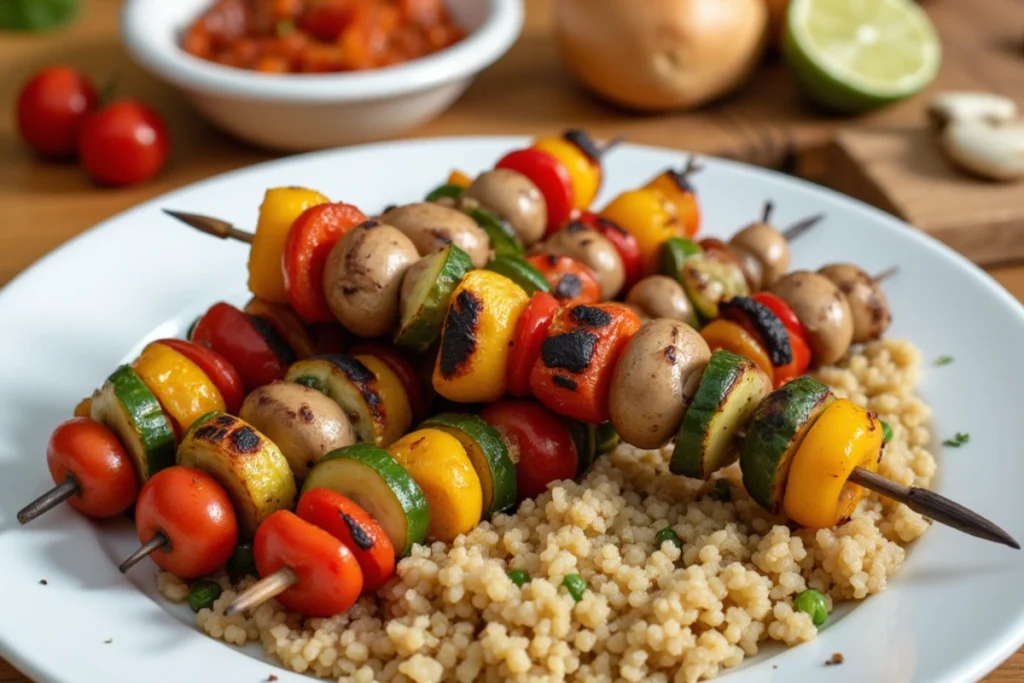Introduction
The Mediterranean diet is celebrated for its health benefits and focus on fresh, wholesome ingredients. For vegetarians, it’s an ideal choice as it naturally emphasizes plant-based foods. This guide explores how to enjoy the Mediterranean diet for vegetarians, offering insights into its benefits, core components, and tips for adopting this lifestyle. For those looking to dive deeper, resources like vegan Mediterranean recipes and Mediterranean-inspired main dishes provide practical and delicious meal ideas.
What is the Mediterranean Diet?
Origins and Principles of the Mediterranean Diet
The Mediterranean diet originated in countries bordering the Mediterranean Sea, such as Greece, Italy, and Spain. It is renowned for its emphasis on fresh fruits, vegetables, whole grains, legumes, and healthy fats like olive oil. By avoiding processed foods, the diet focuses on nutrient-dense, natural ingredients that promote long-term health. Detailed insights into its components are provided in the Mediterranean diet principles for vegetarians.
Key principles include prioritizing plant-based meals filled with seasonal vegetables, fruits, and legumes, while also incorporating healthy fats from olive oil, nuts, and seeds. Whole grains, such as quinoa and bulgur, replace refined options, contributing to the diet’s high nutritional value. Minimal consumption of red meat makes it a perfect fit for vegetarians who rely on plant-based proteins. Recipes for vegetarian-friendly Mediterranean dishes and simple plant-based casseroles highlight these principles effectively.
Why the Mediterranean Diet is Ideal for Vegetarians
The Mediterranean diet naturally aligns with vegetarianism, as its focus on fresh, plant-based foods makes it highly adaptable. Ingredients like lentils, chickpeas, and tofu can easily replace animal protein while maintaining the diet’s nutritional balance. For vegetarians, it offers essential nutrients such as protein, fiber, vitamins, and minerals, all while providing delicious meals that are easy to prepare.
According to Mayo Clinic, the Mediterranean diet supports heart health, reduces inflammation, and promotes overall well-being. These benefits, combined with the diet’s sustainable and flexible nature, make it an excellent choice for vegetarians seeking a balanced lifestyle.
Key Components of the Mediterranean Diet for Vegetarians
Plant-Based Foods
Fruits and Vegetables
Fresh, colorful fruits and vegetables form the foundation of the Mediterranean diet. Seasonal produce like tomatoes, zucchini, eggplants, and peppers provides essential vitamins and minerals while delivering vibrant flavors to every dish. Fruits such as oranges, figs, and pomegranates naturally sweeten meals and boost antioxidant intake, making dishes both nutritious and delicious. Seasonal options align with the principles highlighted in vegan Mediterranean recipes and ensure the diet remains diverse and nutrient-rich throughout the year.
Legumes
Legumes play a crucial role in vegetarian Mediterranean cuisine. People use chickpeas to prepare hummus and falafel, while lentils enhance soups and salads. Fava beans, a Mediterranean favorite, pack a punch with protein and fiber, making them excellent replacements for meat.
Whole Grains
Whole grains contribute energy and help maintain a balanced diet. Cooks frequently incorporate quinoa, farro, bulgur, and barley into Mediterranean dishes. These grains offer nutrients and versatility, fitting well into salads, pilafs, and other recipes.
Healthy Fats
Olive Oil
Cooks often refer to olive oil as liquid gold because it serves as a cornerstone of the Mediterranean diet. They use it in cooking, dressings, and drizzles to add richness and flavor to meals.
Nuts and Seeds
Nuts like almonds and walnuts, along with seeds like sesame and sunflower, provide healthy fats, protein, and crunch. People frequently include these ingredients in snacks, salads, and desserts to enhance flavor and nutrition.
Avocado
Although traditional Mediterranean recipes did not originally feature avocado, this modern addition has gained popularity in vegetarian versions. It offers a creamy texture and delivers healthy monounsaturated fats, adding variety to meals. Incorporating avocado into dishes aligns with the focus on healthy fats emphasized in Mediterranean diet adaptations, enriching the nutritional profile of vegetarian meals.
Protein Sources for Vegetarians
Dairy Products
Cheese and yogurt provide valuable sources of protein in the Mediterranean diet. Dishes often feature feta and halloumi in salads and roasted preparations. Greek yogurt frequently serves as a creamy base for dips and desserts.
Plant-Based Proteins
Vegetarians commonly turn to tofu, tempeh, and seitan as excellent meat alternatives in Mediterranean recipes. These protein-packed options absorb flavors from Mediterranean seasonings like oregano, cumin, and paprika. Grilling, sautéing, or baking them creates flavorful meals. Dishes featuring these ingredients align with the protein-rich focus of Mediterranean-inspired main dishes and provide versatile options for vegetarian cooking.
Benefits of the Mediterranean Diet for Vegetarians
Health Benefits
The Mediterranean diet offers a wide range of health benefits, making it an ideal choice for vegetarians. Its emphasis on fresh, nutrient-dense foods helps improve overall health while reducing the risk of chronic diseases.
Promotes Heart Health
Eating plant-based foods rich in antioxidants, healthy fats, and fiber contributes to better cardiovascular health. Olive oil, nuts, and legumes play a significant role in lowering cholesterol levels and maintaining healthy blood pressure. Studies from Mayo Clinic show that this diet reduces the risk of heart disease significantly.
Supports Weight Management
The diet’s focus on whole grains, fruits, and vegetables, combined with plant-based proteins, creates balanced meals that keep you full longer. This balance helps control hunger and supports healthy weight management.
Improves Digestive Health
The abundance of fiber in whole grains, legumes, and vegetables aids digestion and promotes a healthy gut microbiome. Including foods like lentils and chickpeas enhances the intake of prebiotics, which feed beneficial gut bacteria.
Reduces Inflammation
The anti-inflammatory properties of the Mediterranean diet come from its plant-based fats, antioxidants, and omega-3 fatty acids. Ingredients like olive oil, nuts, and leafy greens help fight inflammation, reducing the risk of diseases like arthritis and diabetes.
Environmental Benefits
Choosing the Mediterranean diet as a vegetarian not only benefits your health but also supports the planet. Plant-based foods have a much smaller environmental footprint than meat-based ones, making this diet more sustainable.
Lower Greenhouse Gas Emissions
Plant-based foods, including legumes and grains, require fewer resources to produce than animal-based products. This reduces greenhouse gas emissions, contributing to a healthier planet.
Supports Biodiversity
The diet’s reliance on seasonal, local produce helps protect biodiversity and encourages sustainable farming practices. By focusing on fresh, unprocessed ingredients, vegetarians reduce their contribution to harmful agricultural practices.
Mediterranean Diet Meal Plan for Vegetarians
7-Day Mediterranean Vegetarian Meal Plan
This meal plan offers a variety of nutritious and flavorful dishes that adhere to the principles of the Mediterranean diet. Each day includes balanced meals featuring fresh produce, whole grains, legumes, and healthy fats.
Day 1
- Breakfast: Greek yogurt with a drizzle of honey, topped with walnuts and fresh figs.
- Lunch: Quinoa salad with chickpeas, cherry tomatoes, cucumber, and olive oil dressing.
- Dinner: Grilled vegetable kebabs with marinated tofu, served with a side of bulgur wheat.
2
- Breakfast: Avocado toast on whole-grain bread, sprinkled with sesame seeds.
- Lunch: Lentil soup with a side of whole-grain pita and a simple green salad.
- Dinner: Spinach and feta-stuffed bell peppers, paired with roasted sweet potatoes.
3
- Breakfast: Smoothie bowl made with almond milk, berries, and a sprinkle of chia seeds.
- Lunch: Mediterranean-style chickpea wrap with hummus, arugula, and roasted red peppers.
- Dinner: Eggplant Parmesan served with a mixed greens salad and balsamic vinaigrette.
4
- Breakfast: Overnight oats with almond butter, banana slices, and a dash of cinnamon.
- Lunch: Tomato and white bean salad with fresh basil and a lemon-olive oil dressing.
- Dinner: Grilled halloumi and vegetable skewers with a side of herbed couscous.
5
- Breakfast: Whole-grain toast with tahini, sliced apple, and a sprinkle of sesame seeds.
- Lunch: Farro and roasted vegetable salad, topped with crumbled feta.
- Dinner: Hearty fava bean stew, served with whole-grain bread for dipping.
6
- Breakfast: Greek yogurt parfait with granola, pomegranate seeds, and honey.
- Lunch: Stuffed grape leaves with a side of tabbouleh salad.
- Dinner: Zucchini noodles with a rich tomato-basil sauce and grilled tempeh.
7
- Breakfast: Spinach and feta omelet, served with whole-grain toast.
- Lunch: Mediterranean quinoa bowl with roasted vegetables, hummus, and a lemon-tahini drizzle.
- Dinner: Roasted eggplant and chickpea stew, paired with brown rice.
Snacking Ideas
- Mixed nuts and dried fruits.
- Hummus with carrot and cucumber sticks.
- Fresh fruit such as oranges or dates.
- A handful of olives with whole-grain crackers.
Nutritional Content (Per 100g)
| Nutrient | Amount |
|---|---|
| Calories | 120 kcal |
| Protein | 5 g |
| Fat | 4 g |
| Carbohydrates | 15 g |
| Fiber | 3 g |
| Sodium | 50 mg |
This meal plan highlights the versatility of the Mediterranean diet for vegetarians, offering balanced and satisfying meals for every part of the day.
Tips for Adopting the Mediterranean Diet as a Vegetarian
Tips for a Smooth Transition
Adopting the Mediterranean diet as a vegetarian doesn’t have to feel overwhelming. With the right approach, you can make the transition seamless and enjoyable.
Start Small
First, begin by gradually incorporating Mediterranean staples into your meals. For instance, you can replace refined grains with whole grains like quinoa and bulgur. At the same time, experiment with legumes such as chickpeas and lentils in your favorite recipes to explore new flavors.
Stock Your Pantry
To make meal preparation easier, keep a well-stocked pantry filled with Mediterranean essentials. Items like olive oil, canned tomatoes, whole grains, and nuts are versatile and simplify cooking. Additionally, fresh herbs like basil, parsley, and oregano add authentic Mediterranean flavors to your dishes.
Plan Your Meals
Creating a weekly meal plan can help you maintain variety in your diet while saving time. For example, planning ahead ensures you have all the ingredients you need and reduces the temptation to rely on processed foods. Furthermore, it allows you to explore new recipes with ease.
Experiment with Recipes
Trying new recipes is another effective way to embrace the Mediterranean diet. For instance, you could prepare lentil soup, stuffed bell peppers, or a chickpea salad with tahini dressing. By doing so, you can keep your meals exciting and discover new favorite dishes.
Common Mistakes to Avoid
Overconsumption of Dairy
Although cheese and yogurt are common in Mediterranean meals, consuming them in large quantities can increase your saturated fat intake. Therefore, balance dairy products with other protein sources like legumes and tofu for a more healthful diet.
Neglecting Protein
Vegetarian diets sometimes lack adequate protein if not carefully planned. As a solution, include legumes, tofu, tempeh, or seitan in your meals to meet your protein needs. Moreover, pairing these with whole grains creates complete protein profiles.
Relying on Processed Foods
Since the Mediterranean diet emphasizes whole, fresh ingredients, avoid relying heavily on processed vegetarian substitutes. Instead, focus on natural, plant-based foods for optimal health benefits.
Skipping Healthy Fats
Healthy fats, like those found in olive oil and nuts, are essential for the Mediterranean diet. They not only provide satiety but also support heart health. Therefore, don’t hesitate to add them to your meals regularly.
By following these tips and avoiding common mistakes, you can fully embrace the Mediterranean diet for vegetarians.
FAQs about the Mediterranean Diet for Vegetarians
What are the best protein sources in a vegetarian Mediterranean diet?
The Mediterranean diet offers numerous excellent protein sources for vegetarians. Legumes such as chickpeas, lentils, and fava beans provide high-quality protein and work well in recipes like soups and salads. Dairy products like Greek yogurt and cheese also supply essential nutrients and protein, complementing the diet’s plant-based focus. Plant-based options such as tofu, tempeh, and seitan enhance variety in vegetarian meals while aligning with the principles of protein-rich Mediterranean dishes. Pairing these proteins with whole grains like quinoa or farro creates balanced and nutrient-packed dishes that fit seamlessly into a vegetarian Mediterranean lifestyle.
Can I follow the Mediterranean diet if I’m vegan?
Yes, vegans can absolutely follow a modified version of the Mediterranean diet. Instead of relying on dairy products, alternatives like almond yogurt or soy-based cheese fit seamlessly into this dietary approach. Nutritional yeast serves as an excellent replacement for cheese in many recipes, providing a savory flavor while keeping dishes plant-based. Vegan-friendly proteins such as lentils, chickpeas, tofu, and tempeh align perfectly with the diet’s emphasis on plant-based eating, as highlighted in vegan Mediterranean recipes. Including olive oil, fresh vegetables, and gluten-free whole grains like quinoa ensures that vegan Mediterranean meals are flavorful, nutritious, and versatile.
How does the Mediterranean diet benefit vegetarians?
The Mediterranean diet provides vegetarians with many health benefits. For instance, it is rich in essential nutrients, including fiber, antioxidants, and healthy fats, which support heart health and reduce inflammation. Moreover, the diet offers a variety of plant-based protein sources, ensuring vegetarians meet their nutritional needs. Furthermore, its focus on whole, unprocessed foods promotes better digestion, aids in weight management, and contributes to overall well-being.
Are there gluten-free options in the Mediterranean diet?
Absolutely, the Mediterranean diet is highly adaptable for those following a gluten-free lifestyle. For example, naturally gluten-free grains like quinoa, millet, and rice can easily replace wheat-based grains such as bulgur or farro. Additionally, the diet’s reliance on fresh vegetables, legumes, nuts, and seeds ensures that gluten-free eaters still enjoy a diverse array of nutritious meals. As a result, vegetarians who need to avoid gluten can confidently embrace the Mediterranean diet.
Is olive oil essential for the Mediterranean diet?
Yes, olive oil is a cornerstone of the Mediterranean diet because it provides healthy monounsaturated fats that support heart health and reduce inflammation. It is frequently used in cooking, dressings, and marinades, offering a rich flavor along with significant nutritional benefits. For individuals unable to consume olive oil, other plant-based oils like avocado oil or canola oil can serve as alternatives. However, these substitutes often lack olive oil’s unique taste and cultural significance, making it an unmatched ingredient in authentic Mediterranean recipes. Its role is particularly evident in Mediterranean-inspired dishes where flavor and health benefits go hand in hand.
These FAQs address common concerns and offer practical solutions for vegetarians exploring the Mediterranean diet.
Conclusion
The Mediterranean diet for vegetarians offers a perfect blend of health, sustainability, and culinary delight. By focusing on fresh, plant-based ingredients such as legumes, whole grains, vegetables, and healthy fats, this diet supports both individual well-being and the planet. Its emphasis on nutrient-rich, unprocessed foods contributes to reducing the risk of chronic illnesses, including heart disease and diabetes, aligning with principles highlighted in vegan Mediterranean recipes.
Adopting this diet doesn’t require giving up favorite flavors; instead, it encourages exploring new ingredients and dishes. For example, replacing meat with chickpeas, lentils, tofu, or tempeh allows vegetarians to enjoy balanced and satisfying meals. Incorporating staples like olive oil, fresh herbs, and whole grains creates vibrant menus that nourish both body and mind. Ideas for such meals can be found in vegetarian Mediterranean main dishes.
Furthermore, the Mediterranean diet is not just about personal health but also about making environmentally conscious choices. Opting for plant-based foods over meat reduces your carbon footprint and supports sustainable eating practices, contributing to a healthier planet. As a result, every meal becomes a meaningful step toward a brighter future for both individuals and the world.
Whether savoring lentil soup, grilling vegetable kebabs, or enjoying a Greek yogurt parfait, the Mediterranean diet provides countless options for wholesome meals. By incorporating the tips, meal plans, and recipes outlined in this guide, individuals can align their choices with health and sustainability values. The Mediterranean diet for vegetarians is more than just a dietary preference—it’s a way of thriving in a sustainable, health-conscious lifestyle.


